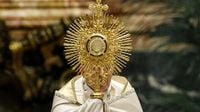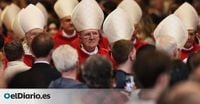On May 8, 2025, the city of Rome was awash in white as it prepared to welcome its new Pope, the 267th in history. This momentous occasion follows the passing of Pope Francis, who died on April 21, 2025, due to a stroke. The conclave, which began on May 7, marks a significant event not only for the Catholic Church but also for the global community, as the choice of a new pontiff carries profound implications.
The tradition of popes adopting new names upon ascending to the papacy has been in place since the 10th century. This practice symbolizes a fresh identity and a commitment to the responsibilities of the papacy. While some names have been frequently chosen, others, like Pedro, Jesús, and Francisco, reflect a more complex relationship with the church's history and reverence.
Throughout history, a total of 266 popes have led the Catholic Church, starting with Saint Peter, the first Pope. The most common names among these pontiffs include Juan, with 23 occurrences, followed by Gregorio and Benedicto, each with 16. Other notable names include Clemente (14), Inocencio (13), León (13), and Pío (12). This pattern suggests that many pontiffs choose names of their predecessors whom they admire or wish to honor.
Interestingly, there are names that have never been used by a pope despite their significance in Christianity. Names such as Pedro, Jesús, José, Tomás, Esteban, Santiago, Andrés, Marcos, and Lucas have all been avoided. The choice not to use Pedro, for instance, may stem from a desire to maintain respect for the original apostle, while the absence of Jesús is likely due to theological reverence.
The choice of a papal name is not merely a formality; it is a deeply personal decision that reflects the new pope's vision and mission. For example, Pope Francis, born Jorge Mario Bergoglio, chose his name in honor of Saint Francis of Assisi, symbolizing humility, simplicity, and a commitment to the poor. His decision was a clear signal of the direction he intended to take during his papacy.
As the world awaits the announcement of the new pope, speculation about the chosen name has sparked interest and debate. A recent internal poll suggested that the name most likely to be chosen might be Juan Pablo III, reflecting a continuity of legacy, while others speculate Gregorio could be the name selected, given its historical significance.
According to tradition, once the new pope is elected, he is asked by the cardinal protodiácono if he accepts the election. If he agrees, the next step is the announcement of his chosen name, which is revealed to the public during the iconic "Habemus Papam" announcement from the balcony of St. Peter's Basilica.
The significance of the papal name extends beyond mere tradition; it serves as a declaration of principles and intentions. Each name carries a message about the pope's priorities and the direction he intends to lead the Church. For instance, Pío IX, the longest-serving pope, chose his name in homage to Saint Pío V, while Benedicto XVI referenced both Pope Benedict XV and Saint Benedict, the patron of Europe, signaling a connection to historical legacies.
As the Catholic Church navigates a period of transition, especially following the reformative impact of Pope Francis, the selection of the new pope's name will be scrutinized as a reflection of the Church's future. The decision will resonate with both the faithful and the broader public, as it will likely influence the Church's approach to various contemporary issues, including social justice, interfaith dialogue, and environmental stewardship.
The new pope's name will not only symbolize continuity but also the potential for change within the Church. With the world watching closely, the moment of revelation will be charged with significance, marking the beginning of a new chapter in the history of the papacy.
In summary, the election of a new pope is not just about filling a position; it is a moment steeped in history, tradition, and the hopes of millions. As the conclave deliberates, the anticipation builds, and the question remains: what name will be chosen, and what vision will it herald for the future of the Catholic Church?





